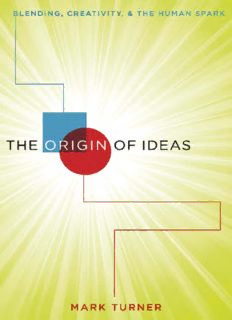
The origin of ideas : blending, creativity, and the human spark PDF
Preview The origin of ideas : blending, creativity, and the human spark
BLENDING, CREATIVITY, & THE HUMAN SPARK OF IDEAS MARK li URNER The Origin of Ideas The Origin Of Ideas Blending, Creativity, and the Human Spark z MARK TURNER 1 3 Oxford University Press is a department of the University of Oxford. It furthers the University’s objective of excellence in research, scholarship, and education by publishing worldwide. Oxford New York Auckland Cape Town Dar es Salaam Hong Kong Karachi Kuala Lumpur Madrid Melbourne Mexico City Nairobi New Delhi Shanghai Taipei Toronto With offi ces in Argentina Austria Brazil Chile Czech Republic France Greece Guatemala Hungary Italy Japan Poland Portugal Singapore South Korea Switzerland Th ailand Turkey Ukraine Vietnam Oxford is a registered trademark of Oxford University Press in the UK and certain other countries. Published in the United States of America by Oxford University Press 198 Madison Avenue, New York, NY 10016 © Oxford University Press 2014 All rights reserved. No part of this publication may be reproduced, stored in a retrieval system, or transmitted, in any form or by any means, without the prior permission in writing of Oxford University Press, or as expressly permitted by law, by license, or under terms agreed with the appropriate reproduction rights organization. Inquiries concerning reproduction outside the scope of the above should be sent to the Rights Department, Oxford University Press, at the address above. You must not circulate this work in any other form and you must impose this same condition on any acquirer. Library of Congress Cataloging-in-Publication Data Turner, Mark, 1954- Th e origin of ideas: blending, creativity, and the human spark / Mark Turner. pages cm Includes bibliographical references and index. ISBN 978–0–19–998882–2 1. Creative ability. 2. Idea (Philosophy) I. Title. BF408.T845 2014 153.2—dc23 2013015132 1 3 5 7 9 8 6 4 2 Printed in the United States of America on acid-free paper Contents Acknowledgments vii 1. Th e Human Spark 1 2. Catch a Fire 11 3. Th e Idea of You 31 4. Th e Idea of I 65 5. Forbidden Ideas 107 6. Artful Ideas 145 7. Vast Ideas 175 8. Tight Ideas 191 9. Recurring Ideas 221 10. Future Ideas 253 Appendix: Th e Academic Workbench 261 Notes 271 References 279 Index 287 Acknowledgments I am grateful to the Norwegian Ministry of Education and Research and to its Centre for Advanced Study at the Norwegian Academy of Science and Letters for a fellowship year in 2011–2012. Th is book was written during my residency in that superb company. I thank Joan Bossert, my editor at Oxford University Press; the many members of her staff who assisted in the publication of this book; Arthur Evenchik; and several very helpful anonymous reviewers. Th is book draws on a number of articles, chapters, and online presen- tations I have published previously, including the following: “Th e Art of Compression” 2006, in Th e Artful Mind: Cognitive Science and the Riddle of Human Creativity, edited by Mark Turner (Oxford University Press); “Th e Scope of Human Th ought” August 17, 2009, On the Human (target article in an online forum run by the National Humanities Center); “Th e Origin of Selkies” 2004, Journal of Consciousness Studies, volume 11, numbers 5-6; “Th e Mind is an Autocatalytic Vortex” 2008, in Th e Literary Mind, Volume 24 (2008) of R EAL: Yearbook of Research in English and American Literature , edited by Jürgen Schlaeger (Tübingen, Germany: Gunter Narr Verlag); “Th e Ghost of Anyone’s Father” 2004, in Shakespearean International Yearbook , volume 4, edited by Graham Bradshaw, Th omas Bishop, and Mark Turner (Hants, UK: Ashgate Publishing Limited); and “Double-scope stories” 2003, in N arrative Th eory and the Cognitive Sciences , edited by David Herman (Stanford: Center for the Study of Language and Information).
Description: